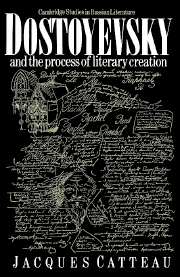Book contents
- Frontmatter
- Contents
- Preface to the English edition
- List of abbreviations
- General editor's note on transliteration and references
- General introduction
- PART I The creative environment
- Introduction
- 1 Forms of creativity in embryo
- 2 The heritage
- 3 The heritage: literature
- 4 The heritage: history and philosophy
- 5 Illness
- 6 Money
- PART II The process of creation
- Part III Time and space in the world of the novels
- Conclusion
- Notes
- Select bibliography
- Index of names
4 - The heritage: history and philosophy
Published online by Cambridge University Press: 18 December 2009
- Frontmatter
- Contents
- Preface to the English edition
- List of abbreviations
- General editor's note on transliteration and references
- General introduction
- PART I The creative environment
- Introduction
- 1 Forms of creativity in embryo
- 2 The heritage
- 3 The heritage: literature
- 4 The heritage: history and philosophy
- 5 Illness
- 6 Money
- PART II The process of creation
- Part III Time and space in the world of the novels
- Conclusion
- Notes
- Select bibliography
- Index of names
Summary
Literature, bestowing worlds and forms, offers a free and immense field to the creative imagination, but history, philosophy and religion are received as instruction, objective or revealed truths, less malleable and less capable of being metamorphosed. But although Dostoyevsky's powerful ability to synthesise could not dispose so freely of the reality delivered by history, by didactic systems of philosophy, or the sacred texts of religion, he imprinted his own personal seal on the materials he used in the creation of his novels.
There was a great difference between these materials and the literary heritage, which was settled in its main lines before the period of the great novels, at least with regard to universal literature, for Dostoyevsky followed Russian literary development with close attention all his life, especially the writings of his peers and rivals: Turgenev, Saltykov- Shchedrin and Tolstoy. But though he endlessly read and reread the favourite authors of his youth, bringing them back to life in spite of fashion in his Diary of a Writer, from 1863–4 onwards he was relatively indifferent to everything newly published in the West and particularly in French literature, which he loved and read in the original. He practically ignored Stendhal, whose talent Pushkin had recognised as early as 1831, and never mentioned Baudelaire, who is a kindred spirit. Michel Cadot in The “Double Postulation” of Baudelaire and its Dostoyevskian version' compares ‘Mon coeur mis à nu’, Baudelaire's proposed definition of Tannhäuser, with some passages in The Brothers Karamazov: there are the same words, the same formula: ‘the human heart a field of battle between Satan and God’, the same double postulation towards heaven and hell.
- Type
- Chapter
- Information
- Dostoyevsky and the Process of Literary Creation , pp. 63 - 89Publisher: Cambridge University PressPrint publication year: 1989



